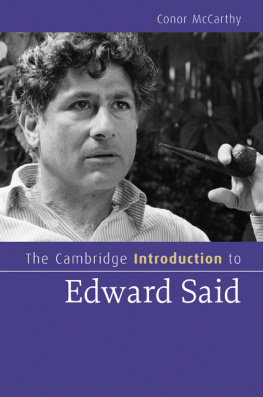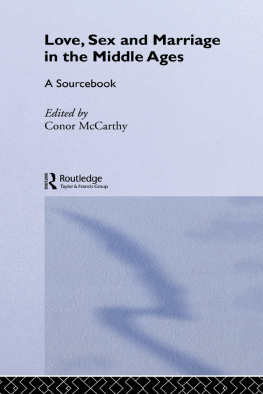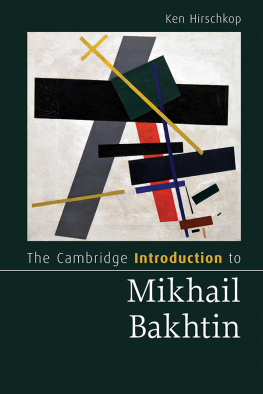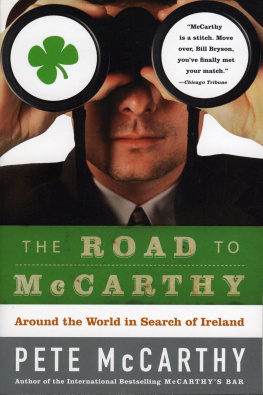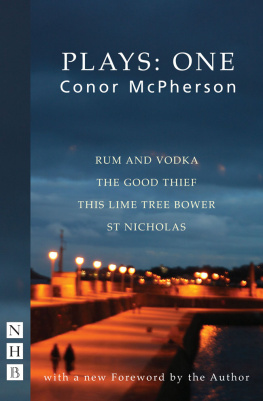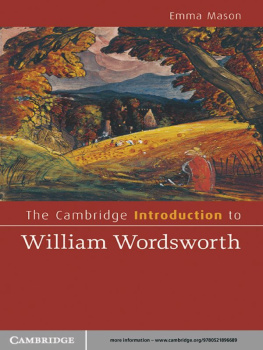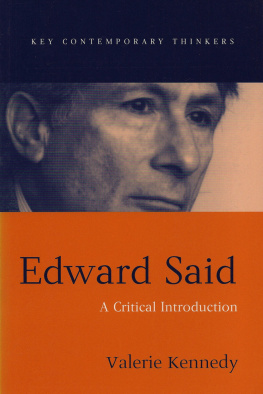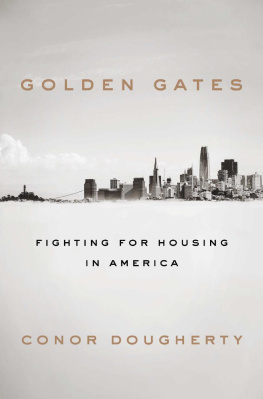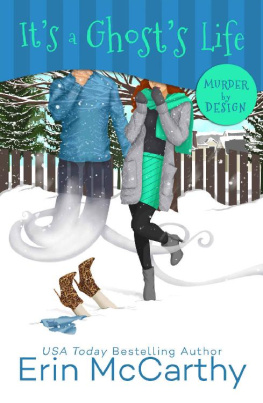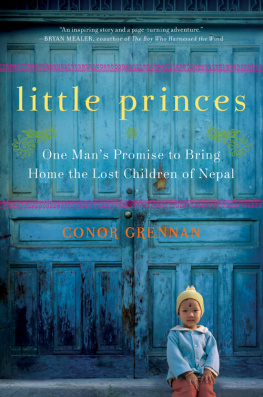Conor McCarthy - The Cambridge Introduction to Edward Said
Here you can read online Conor McCarthy - The Cambridge Introduction to Edward Said full text of the book (entire story) in english for free. Download pdf and epub, get meaning, cover and reviews about this ebook. year: 2010, publisher: Cambridge University Press, genre: Science. Description of the work, (preface) as well as reviews are available. Best literature library LitArk.com created for fans of good reading and offers a wide selection of genres:
Romance novel
Science fiction
Adventure
Detective
Science
History
Home and family
Prose
Art
Politics
Computer
Non-fiction
Religion
Business
Children
Humor
Choose a favorite category and find really read worthwhile books. Enjoy immersion in the world of imagination, feel the emotions of the characters or learn something new for yourself, make an fascinating discovery.
- Book:The Cambridge Introduction to Edward Said
- Author:
- Publisher:Cambridge University Press
- Genre:
- Year:2010
- Rating:3 / 5
- Favourites:Add to favourites
- Your mark:
- 60
- 1
- 2
- 3
- 4
- 5
The Cambridge Introduction to Edward Said: summary, description and annotation
We offer to read an annotation, description, summary or preface (depends on what the author of the book "The Cambridge Introduction to Edward Said" wrote himself). If you haven't found the necessary information about the book — write in the comments, we will try to find it.
The Cambridge Introduction to Edward Said — read online for free the complete book (whole text) full work
Below is the text of the book, divided by pages. System saving the place of the last page read, allows you to conveniently read the book "The Cambridge Introduction to Edward Said" online for free, without having to search again every time where you left off. Put a bookmark, and you can go to the page where you finished reading at any time.
Font size:
Interval:
Bookmark:

One of the most famous literary critics of the twentieth century, Edward Said has been hugely influential far beyond academia. As a prominent advocate for the Palestinian cause and a noted music critic, Said redefined the role of the public intellectual. In his books, as scholarly as they are readable, he challenged conventional critical demarcations between disciplines. His major opus, Orientalism , is a key text in postcolonial studies that continues to influence as well as challenge scholars in the field. Conor McCarthy introduces the reader to Said's major works and examines how his work and life were intertwined. He explains recurring themes in Said's writings on literature and empire, on intellectuals and literary theory, on music and on the Israel/Palestine conflict. This concise, informative, and clearly written introduction for students beginning to study Said is ideally set up to explain the complexities of his work to new audiences.
Conor McCarthy is Lecturer in English at the National University of Ireland, Maynooth.

For Alice, Anna, Poppy, and William, and in memory of Rachel Corrie.
This book would not have been written without the support of many people. Firstly, my mother, though she is not here to read and question this book, always supported my projects and my interest in Edward Said.
My encounter with Edward Said began when Ellen Goodell gave me my first copy of Orientalism . I initially read Said with Seamus Deane, Thomas Docherty, and, in particular, Declan Kiberd, and for their guidance and encouragement I am very grateful. More recently I have learned much from conversations with Bashir Abu-Manneh, Joe Cleary, and David Lloyd.
I was fortunate enough to meet Edward Said on several occasions, and his brilliance, warmth, and openness were always compelling. Jean and Simone Mohr and Mariam Said have been very kind in facilitating the use of the cover photograph for this book.
I am grateful to Finbar Cullen at the Ireland Institute, to Ronit Lentin at Trinity College Dublin, and to my colleagues Joe Cleary and Colin Graham for opportunities to write and speak about Said. The library staff at the Mater Dei Institute of Education were very helpful to me. A most enjoyable residency at the Heinrich Boll Cottage, Achill, Co. Mayo, in July 2006 helped me get this work under way. Ruti Levi of Ha'aretz , and Nick Richardson of the London Review of Books assisted me with stray references.
It gives me particular pleasure to record that this work has been completed in the friendly and stimulating ambience of the Department of English at the National University of Ireland at Maynooth: my gratitude for their support and faith goes to Professor Christopher Morash and my colleagues in the Department, and also to Emeritus Professor Brian Cosgrove.
I owe a longtime debt to Norman Vance, for his erudition and example, and for his indefatigable support and kindness over many years.
It is to Ray Ryan that I owe the opportunity to write this book, and I am deeply grateful to him for that chance, and for his encouragement, cajoling, and endless patience during the process. Maartje Scheltens, Thomas OReilly, Caroline Howlett and Christina Sarigiannidou have been very tolerant and helpful in the production process.
My comrades Raymond Deane, Sally Eberhardt, Dara Fox, Andrew Kincaid, Chris Lee, Graham MacPhee, Mark Quigley, and Zohar Tirosh have provided me with an intellectual context of conversation and challenge. Luke Gibbons, Kevin Whelan, and the late Siobhan Kilfeather have all been generous to me over the years.
Thanks of a very special kind are due to Joanne Fox, for everything.
For a list of titles published in the series, please see .
Font size:
Interval:
Bookmark:
Similar books «The Cambridge Introduction to Edward Said»
Look at similar books to The Cambridge Introduction to Edward Said. We have selected literature similar in name and meaning in the hope of providing readers with more options to find new, interesting, not yet read works.
Discussion, reviews of the book The Cambridge Introduction to Edward Said and just readers' own opinions. Leave your comments, write what you think about the work, its meaning or the main characters. Specify what exactly you liked and what you didn't like, and why you think so.

